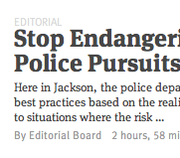The death of west Jackson resident Lonnie Blue Jr. has raised questions about stricter pursuit policies and whether police chases are worth it. Photo courtesy Gofundme
JACKSON — Just before midnight on March 21, Lonnie Blue Jr. was heading home from his job at the Nissan plant in Canton. About the same time, less than 10 miles away, Officer Aaron Wilbanks from the Clinton Police Department responded to a shoplifting call from the Walmart in Clinton. Wilbanks, as the patrol officer on duty, pursued the driver, Donnell Johnson, who fled in a car with improper tags into Jackson city limits, zigzagging at high speeds through residential neighborhoods and quiet areas of west Jackson.
JFP Editorial: Stop Dangerous Police Pursuits
The JFP Editorial Board urges suburban police districts to adopt stricter and safer police-pursuit policies—and to stop spreading the danger into other jurisdictions.
Other officers from CPD joined Wilbanks' pursuit through the dark streets, until Johnson veered into the oncoming lane and struck Blue's car in West Jackson. Blue died on the scene. He was 34.
Police pursuits take nearly one life a day in the United States, data from the National Highway Traffic Safety Administration shows. Of these, one out of every three deaths is an innocent bystander or motorist. The recent death of Blue has set off Jackson residents, as well as backlash from public officials including Ward 3 Councilman Kenneth Stokes, Ward 4 Councilman De'Keither Stamps and Jackson Police Chief Lee Vance who has expressed his concerns and disagreement with pursuing suspects over misdemeanor offenses.
For $588.88 in Merchandise
Johnson, and his two passengers, James Earl Williams and Ashley Travis, were known to shoplift from the Clinton Walmart, employee statements in the police report indicate. That night, a Walmart employee saw Johnson and Travis push a computer in a shopping cart through an empty lane past an unmanned register and walk out the door. Another loss-prevention employee followed them into the parking lot and was able to grab a couple of the stolen items, a wireless boom box and a pair of headphones totaling $159.76, before the suspects jumped into the car and fled. When police recovered the stolen items after the crash, an HP laptop and a pair of headphones, they noted that the electronics cost a total of $588.88.
Officers, citizens and experts all agree that the best way to end dangerous police pursuits is to terminate the pursuit, but the idea of allowing criminals to run free after committing crimes doesn't sit well.
Code Blue: Police Pursuits Cost a Life a Day
A police pursuit killed a mother in Flowood in 2012. Learn why law-enforcement agencies are adopting strict pursuit policies.
Kevin Lavine, a criminologist and criminal-justice professor at Jackson State University, has worked in law enforcement in some capacity for 27 years, from being a military police officer, to working at JPD and with the Mississippi Gaming Commission. He says pursuits can be a necessary evil, but must be conducted responsibly.
Lavine said each department must hold officers to certain standards, and while there are no official state or federal guidelines on pursuits, police could prevent countless deaths by adopting standard operations and procedures. He says the most common practice in such cases is to reduce officer speed or back off completely and communicate with the leading department or the department residing over that jurisdiction. He said pursuit policies are purely administrative, meaning they are set by individual jurisdictions, although the International Association of Chiefs of Police offers suggestions.
It is up to the department whether to punish an officer who breaks policy, and Lavine stresses that there must be some sort of repercussion on the back end.
"If it comes to court, this is what the prosecutor is going to ask: What is your pursuit policy? It's in black and white," he said.
In the Jackson Police Department police pursuit policy, it states, "Officers shall initiate and continue vehicle pursuits only when the related offense is a violent felony and when the benefit apprehension outweighs the risk of injury or death." The policy outlines the definition of a felony, which includes kidnapping, murder, armed robbery, forcible sexual assault and carjacking. The pursuit supervisor can immediately terminate the pursuit if it does not conform to the policy.
As of press time, requests for Clinton Police Department's pursuit policy have not been answered.
#Tellthewholestory: Clarion-Ledger Edits Stamps' Chase Remarks
The Clarion-Ledger ran edited comments from Councilman Stamps' remarks at a rally against police chases.
Alternatives to Pursuits
Lavine said that while policies are important, it's equally vital that there be an open line of communication between agencies. In last month's pursuit into west Jackson, both departments had differing stories of who contacted whom during and after the chase. JPD stands by Chief Vance's statement that JPD contacted Clinton first. Clinton says JPD knew the chase was going on.
In the video, released days after the crash, JPD can be seen zooming by, but going in the opposite direction.
Having a widespread information system that includes photo information and charges for suspects as well as a database for crimes can curtail these problems, Lavine said. He said the state could end the tragedy of deaths by police pursuits having an open online information system between departments, enforcing stricter policies or creating state guidelines.
"Will it stop it? No, but it will give us a tool to cut down on these reckless crimes," Lavine said.
Gareth Jones, a member of the Special Investigations Unit in Toronto in Canada, has investigated police conduct, including injuries that occur as a result of police pursuits since the 1990s. He told the Jackson Free Press that police policies nationwide are becoming more restrictive because departments are beginning to realize that it isn't ideal to chase someone for a relatively minor offense if it means someone may end up dead.
"For something less serious than that (shoplifting) then why are you engaging in a high-speed pursuit in the first place?" Jones said during a phone interview. "Does the danger created by the pursuit outweigh the need to apprehend the offender? That's the basis of most police pursuit policies."
Alternatives to police pursuits include air support with helicopters, tire-deflation devices, stationary roadblocks and a new tagging service called StarChase. StarChase allows officers to fire a GPS device onto the vehicle that allows officers to fall back on the pursuit and track the suspect until in a safer location.
"Really, the best alternative to a pursuit, (and) I know it's trite to say so, is not to have one in the first place unless it's absolutely necessary," Jones said.
Read more coverage of police pursuits at jfp.ms/policechases. Email Deputy News Editor Maya Miller story ideas or crime tips at [email protected]. Follow her on twitter @MayaLMiller.
Clarification: This story has been updated to reflect changes to the StarChase GPS tracking devices. The issue of devices not sticking to vehicles has been corrected by the manufacturer, and problems of the device not deploying was a matter of human error, a report from the National Institute of Justice shows. The Jackson Free Press apologizes for any confusion.






Comments
Use the comment form below to begin a discussion about this content.
comments powered by Disqus